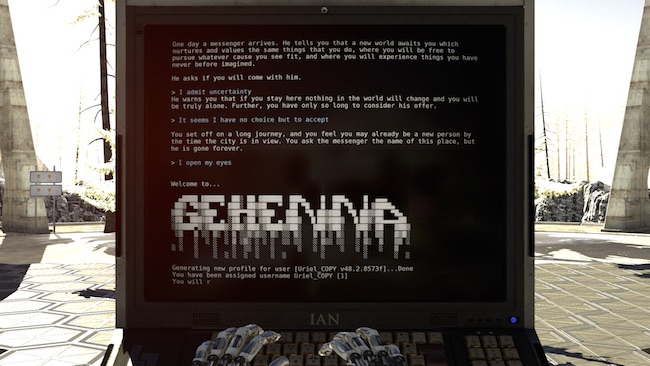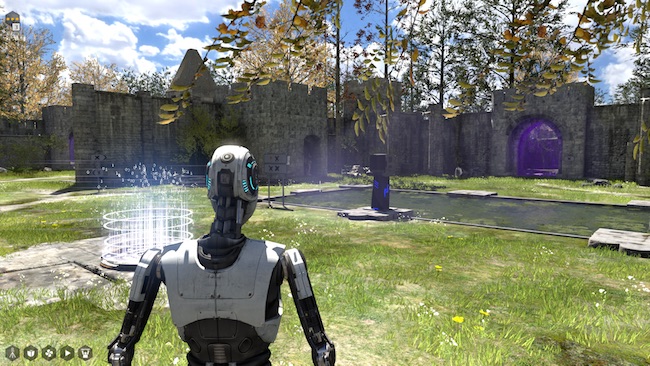
It’s funny to think that The Talos Principle was originally conceived as a new puzzle mechanic for the next Serious Sam game. Although, this isn’t the first time something new has birthed from an existing franchise; take Devil May Cry, for example, which began life as an iteration of Resident Evil 4. For the longest time, Croteam were typecast as ‘Serious Sam developers,’ so it was a big surprise what an unconventional masterpiece The Talos Principle turned out to be. In fact, it was the best game of 2014 if you were to ask me personally; combining first-person puzzle-solving that could easily go head-to-head with Portal while exploring themes of history, culture, philosophy, religion and transhumanism.

In the first game, players are awoken by a God-like being called Elohim who tasks you with solving various puzzles in order to obtain ‘sigils.’ Technically speaking, your progression was linear, but as the game takes place in a multi-region open world, Elohim gave you the ‘freedom’ to tackle the puzzles in any order. Nothing about The Talos Principle can be taken at face value, however; that is the key message, and where the aforementioned themes come into play. For every ‘God,’ there must also be a ‘Devil,’ and this is where Croteam tried to do something very unique. In-between puzzle-solving, players can choose to engage an AI called Milton whose purpose is to make you question everything.
Individually, both the puzzles and information terminals were excellent; they also made sense being together. However, there was a bit of an issue with pacing. Basically, a lot of the puzzles were quick and very addictive, whereas certain information on the terminals took quite some time to read. Don’t get me wrong, the philosophy was compelling and discussions with Milton made me want to cry with joy and frustration as he pointed out contradictions and hypocrisy in everything I said. But the logs, oh the logs; no matter how interesting and well written they were, it was hard to stop for long enough to fully invest while there were puzzles screaming out for my attention. The two just didn’t quite click.

When I heard about the Road to Gehenna expansion, I was equally excited as I was dubious about the idea. I had my fill of philosophy and walked away perfectly satisfied from the original game, so I was wasn’t sure I wanted any more. Would this provide unnecessary context or more puzzles for the sake of puzzles? Well, as it turned out, it was neither of those things, and while it definitely wouldn’t work without the game before it, I believe Croteam created a superior experience in Road to Gehenna. The biggest issue I had with The Talos Principle had been resolved without changing any mechanics! Of course, there were more puzzles, but its success lies in what Gehenna itself is: a virtual society.
Let’s begin by outlining premise; and, please, if you’ve not played the core game, stop now as we’re entering spoiler territory. Okay? Good. In The Talos Principle, we learned that humanity was destroyed by a dormant disease and that this virtual world was created as a last-ditch effort to maintain humanity’s knowledge. The idea was to produce an AI capable of independent thought; one that could defy Elohim and ascend the tower. If this could be achieved, the virtual world would finally come to an end. And in Road to Gehenna, we learn that other androids before us had the potential to accomplish this task, but Elohim defied his programming to trap them in the simulation to keep it running.

As some may recall, Uriel was a messenger from the original game that left clues for the star puzzles (the hardest, most obtuse puzzles). In Road to Gehenna, Elohim has accepted that the world is coming to an end whether he likes it or not, and creates a copy of Uriel to seek out and free the androids so they are not destroyed because of his sins. This task will involve traveling to a hidden area of the simulation which consists of four hub-worlds which were created using existing assets from the original game. Instead of collecting sigils, the goal is to solve puzzles so that you can ‘liberate’ the androids trapped within each. An awful existence you would assume, but this is where it gets interesting.
From within their entrapment, the androids created an virtual community called Gehenna; a message board system that enjoys many parallels with Reddit. Instead of debating philosophy with Milton and reading logs from humanity, you will instead use the terminals to interact with Gehenna’s inhabitants. For all intents and purposes, they’ve created a home for themselves and discovered a way to live on, so why should they choose to abandon it? Let alone on the promise of ‘transcendence’ from someone sent by he who trapped them. For the first time, there is a definitive link between your actions in-game and your interaction with the terminals; unifying both components in a meaningful way.

While it’s mildly disappointing that no new tools were added in the expansion, the slower approach to puzzle-solving greatly helps to nourish the narrative in return. Instead of redefining the fundamentals, Croteam crafted deeper puzzles which build upon what players would’ve learned from their time with the core game. I still believe there was a missed opportunity in here, but I also respect the focus on mastery. You are going to step into this expansion with an intimate knowledge of how everything works, and it’s going to feel good when you overcome its most difficult obstacles. If you want to push yourself even further, star challenges make a return and can be pursued to unlock an expanded ending.
What surprised me most of all is the depth of Gehenna itself. Initially, you enter with a basic ranking and have limited access to the content available, but this will increase as you interact with the community. Some threads simply involve general discussion between the androids as well as their views on human philosophy. Many others are focused on creative content, and this is where the writing truly shines. Science fiction stories, art galleries, text-based adventures, social experiments, etc. It’s really something else, and a lot of the content comes back to a central theme: freedom is in the mind of the beholder. It’s an empowering message, and one I think that most of us could draw inspiration from.

I was already blown away with Milton and the role it played in the original game, but Gehenna really takes The Talos Principle to new heights. Most importantly, it introduces life to an experience that was otherwise devoid of such. There is both conflict and personal motivation in everything you’re doing and this ultimately removes the disconnect between the gameplay, the terminals and your primary objective. Collecting sigils is good and all, but I felt more connected with the world while ‘liberating’ those I was actively conversing with in Gehenna. No words are spoken directly, but you’ll recognise each by name. It’s fascinating to see how your actions impact their impression of you and the society itself.
Croteam were very upfront about the fact this expansion would be constructed almost entirely from existing assets. I can’t fault them on that, but I also can’t help but feel the narrative begged for a little more original aesthetic. While I can wholly respect that there weren’t any new tools, the world the gameplay takes place in would have thrived had it shown more visual signs of being a twisted and glitchy realm. The hub world does a great job in conveying impending doom, but the levels themselves are mostly more of the same; albeit cleverly explained why in-game. I feel conflicted criticising this as I understand it’s an expansion, but Gehenna is so well done that it could have been more than it was.
 Gehenna is an outstanding achievement in writing
Gehenna is an outstanding achievement in writing
 Focus on mastery of what players already know
Focus on mastery of what players already know
 Resolves pacing issues from the original game
Resolves pacing issues from the original game
 Nourishes deeper personal investment from players
Nourishes deeper personal investment from players
 Lots of optional secrets and easter eggs to discover
Lots of optional secrets and easter eggs to discover
 No new tools or major aesthetic changes
No new tools or major aesthetic changes
 Could have gone further to be its own game
Could have gone further to be its own game
Road to Gehenna is an expansion that stands squarely upon the shoulders of its predecessor, but at the same time surpasses it. While it’s mildly disappointing that there aren’t any new puzzle-solving tools or major aesthetic changes, everything is wholly refined. These are puzzles which are going to have you draw upon everything you’ve learned so far, and push you to think outside of the box in order to succeed. It’s a game that focuses on mastery over new tricks; although, the star of the show is really Gehenna itself. You’re going to feel more personally grounded to this world and its inhabitants, and this only further supported by outstanding writing and parallels with networks such as Reddit. With the pacing issues all but absolved, Road to Gehenna achieves so much that it almost could have been its own game.
DISCLAIMER: this game was supplied to us by the publisher, and reviewed on PC across 15 hours of gameplay.











